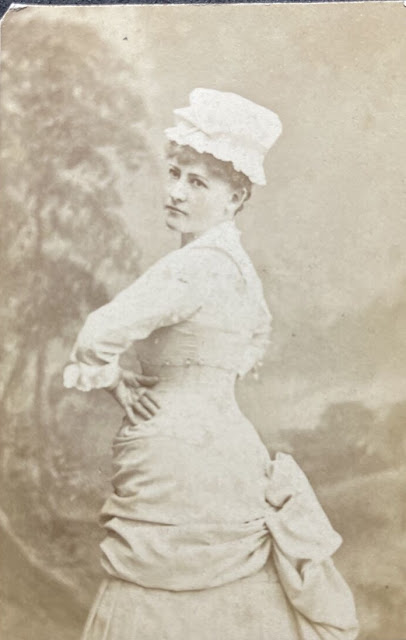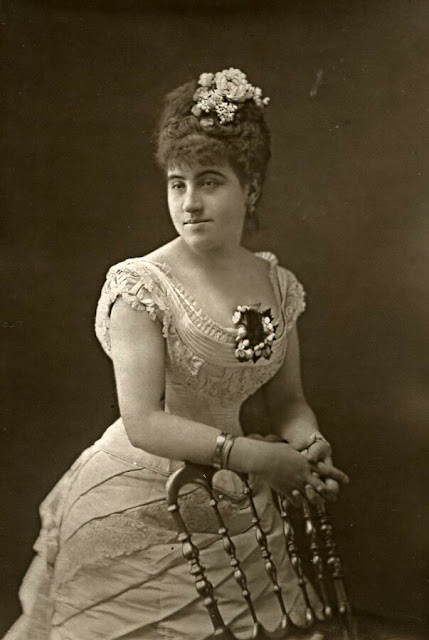The Operetta Research Centre sent me a new 2CD set to review ..
A new recording from Bru Zane? After the tremendous job they did with La Fille de Madame Angot, I am all agog. What is it to be? They are deliciously inclined to be adventurous ...
Well, they have been adventurous. A full-scale recording of an Offenbach score which, until recently, I didn't know had been recorded - even in part -- at all. The 1875 Gaîté spectacular féerie Le Voyage dans la lune which, in its time, went around the world.
 |
| Ill-fated American 'Kate Munroe' was London's Fantasia |
When, in 1990, I put out my Musical Theatre on Record, covering (as I thought) every recorded musical and operetta of the vinyl era, I was unaware that there existed a 1961 disc of a French radio broadcast of a large selection from Le Voyage dans la lune. Well, maybe in those days there wasn't, but there is now (on Malibran), and I've listened to it with pleasure. All the main vocal pieces of the show are there, performed by two really great performers of the French 1960s -- Claudine Collart, whose Eurydice remains one of the most outstanding on vinyl or any other medium, and the ravishing tenor, Michel Hamel. But. The music was written for two sopranos. So, while Hamel is as brilliantly French-tenorious as ever, and it is a total joy to listen to him and Collart singing the merry music of the score to Le Voyage dans la lune, we are not strictly hearing Offenbach's music 'as she was writ'.
I see, as I prepare to listen to the new recording, that Bru Zane have remedied that, and that the music written for Zulma Bouffar as the hero of the piece is sung by a (mezzo) soprano.
The score of Le Voyage dans la lune is (like that of Le Roi Carotte) of a different kind to those of the well-known opéras-bouffes of the Offenbach canon. Because this is not an opéra-bouffe. It is a féerie, in the well-established genre of Rothomago, La Biche au bois, La Poule aux oeufs d'or and so many other long-enduring Paris hits. No burlesque here, everything about the production is subservient to the physical staging, the ballets and the special effects. And, boy, did the Parisians of that time know, well and truly, how to do 'spectacular'. So, we have a Rocket to the Moon, an exploding volcano, the glass palace, the mother-of-pearl galleries and, most successful of all, a snow scene with a ballet of swallows ... all that and some typically tuneful Offenbach music ... promising? But it's tough, for on disc we have the music without the visuals ...
Well, having prepared myself by a quick re-listen to the 1961 recording here I go on the 2022 full-scale one!
***
Right. Three hours later. Congratulations Bru Zane and all those concerned with this very valuable and enjoyable double-disc. We now have a complete (apart from the various Popotte-Thérésa interpolations, which arrived later) Le Voyage dans la lune to range on our shelves among the growing ranks of 'intégrales'.
The problem with intégrales, in general, for simple, pleasant listening as opposed to reference, is that you get all the bits of scene music and chorus exits and entrances in between the Bits That Matter. And in a féerie, there are lots of incidentals. Decorative bits which Don't Really Matter when you can't see the spectacles which they accompany. I know the ballet music is pretty, but it is there merely to accompany the nearly-naked legs-display of a hundred little girls, and it seems rather insignificant without them. Etcetera.
The other problem is the age old one of actors who can't sing, and singers who can't act. Bru Zane's casting department (as in Angot) has avoided the traps of this one splendidly, but ... in one case we have an important artist who acts deliciously, sings splendidly ... but in two different voices. It means that you are listening, in a way, to two different performances. Almost as in the days when record companies used actors for the spoken bits and singers for the music, without even pretending they were the same character.
Well, those are my only grumblettes. And they are, in general, not really about this recording, but about intégrales as a concept. And of course, they are most particularly relevant in a record of a show in which the number one attraction is the visual rather than the musical (or textual) side. A dimension is lacking.
Bien. On to the overwhelming positives. The orchestra under Pierre Dumoussaud is splendidly and intelligently supportive of the singers and gets its go in the rather dreary overture (not helped, to English ears, by its resemblance to 'Away in a Manger') and the ballets. The chorus is, as French choruses invariably are, there when they are needed. Here, they get a lot of the incidental bits, and perform them bravely.
The dialogue which is included is excellently done, and actually makes me cease to regret its presence. The diction throughout is clear, unaccented ... perfectly directed. And King V'lan (Mathieu Lécroart, the Larivaudière of Angot) is just (again) superb.
 |
| 'V'lan, je suis V'lan' |
So, we come to the singers and the songs. The songs include some gems. The big hit first time round was the Ronde des Charlatans, led by Mlle Bouffar (Caprice) to first-night hurrahs. The jewel, for me, is her/his first-act 'Papa, je veux la lune'. There is a bit of padding in Act 3, and somehow extra songs were later stuffed into the score for the saucy diva of the halls, Thérésa ... a star doing a stand-up act amongst the scenery ... but, over all, the solos for Caprice and Fantasia are the key features of the score, in the good old fashion of the féerie. Now we sing, now we dance, now we look at the scenic effects. Mostly, in turn. A bit of everything for everyone. Even if mostly the ooooh-aaaaah patrons.
 |
| Céline de la Pommeraye of the Paris Opéra. London's Caprice. |
The ladies cast on this recording do a fine job. Singly and together. My favourite track here was the Duo des Pommes, where, evenly matched, the two singing stars caracoled along wonderfully in partnership.
 |
| Le Prince Caprice |
Caprice (Violette Polchi) caused me a little problem initially. He/she squealed 'Papa' in such spunky, characterful tones, and then came his/her show-topping song ('Papa, je veux la lune') and ... out came this rather covered mezzo voice. I'd re-record this track. She subsequently loosens up, lightens up, the waltz is delightful, and when she gets into the quick music and the famous Charlatans number with its big bass drum he/she is full-stop fun with the palate floating free and the melodies zinging out wonderfully.
 |
| Noémie Marcus, the original Fantasia |
I was nervous as to what I would think of Fantasia as her entrance drew nigh. I mean, after the quasi-perfect Claudine Collart... But lo! Sheva Tehoval made a simply delightful job of, in particular, 'Je suis nerveuse' and scored a real winner with Ms Polchi in the duet. Just shows you, we have singers in the 21st century just as grand as we had in the last two! But you'ld have to bash me over the head to make me renounce les Liliane Berton, Lina Dachary, Raymond Amade, Claude Devos and Claudine Collart of the Golden Age of Pathé ...!
Well, I guess it comes down to this: If I want a fix of Lune music, for a half-hour's incidental enjoyment, I'll press Claudine and Michel's button. If I'm being 'serious' and want an accurate night in the 1875 theatre, this recording will do me very finely indeed. Thank you.
Keep going, Bru Zane ...! More, more, more of these ... would you dare a Cent Vierges or .... well, we really need a modern-day Geneviève de Brabant (with a modern-day Mme Martens!) ... and much as I love Henri Legay as Barbe-bleue ...


Offenbach_Jacques_bpt6k317546z.jpg)





No comments:
Post a Comment